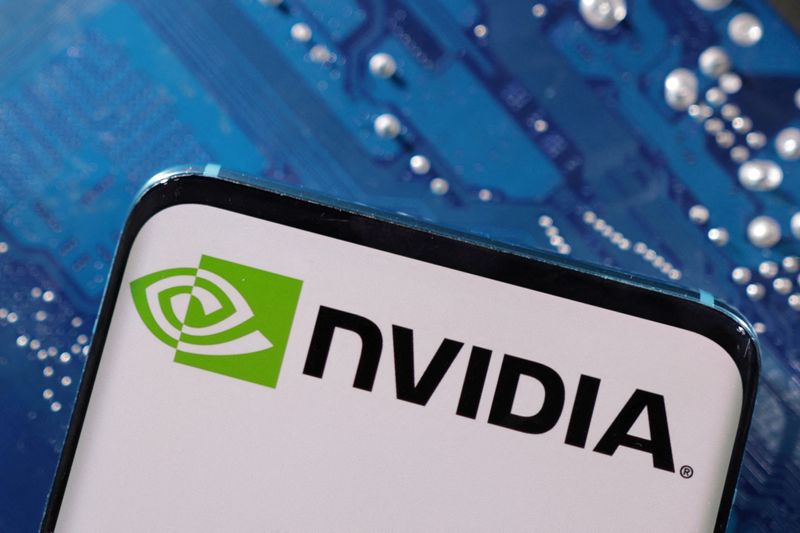US Supreme Court dismisses Nvidia's bid to avoid securities fraud suit
By John Kruzel
WASHINGTON (Reuters) -The U.S. Supreme Court dismissed on Wednesday an appeal by artificial intelligence chipmaker Nvidia (NASDAQ:NVDA ) seeking to avoid a securities fraud lawsuit by shareholders who accused the company of misleading investors about how much of its sales depended on the volatile cryptocurrency market.
The justices, who heard arguments in the case on Nov. 13, opted not to render a decision on the underlying legal dispute and instead threw out Nvidia's appeal of a lower court's ruling that allowed the 2018 class action to move forward. The lawsuit is led by the Stockholm, Sweden-based investment management firm E. Ohman J:or Fonder AB.
The Supreme Court, in determining that it should not have granted the appeal, left the lower court's decision in place.
The Supreme Court's dismissal came in a one-line order that provided no explanation.
During the arguments, some of the justices expressed reservations about intervening in the case. They wondered about whether there was a clear legal issue for them to decide, as opposed to just a dispute over facts, and indicated that they were not ideally placed to resolve the case given its technical complexities.
At issue was whether the plaintiffs cleared the heightened legal bar for bringing private securities fraud suits set under a 1995 federal law called the Private Securities Litigation Reform Act that aimed to screen out frivolous litigation.
The plaintiffs accused Nvidia and its CEO Jensen Huang of violating a 1934 federal law called the Securities Exchange Act by making statements in 2017 and 2018 that falsely downplayed how much of Nvidia's revenue growth came from crypto-related purchases.
Beginning in 2017, as the price of certain cryptocurrencies rose, Nvidia's chips became increasingly popular for cryptomining, a process that involves performing complex math equations in order to secure cryptocurrencies such as bitcoin and ether.
By late 2018, amid a decline in crypto profitability, Nvidia's revenue fell short of its projections, leading its stock price to fall in early November of that year.
The suit seeks unspecified monetary damages in part to recoup the lost value of the Nvidia stock held by the investors.
Nvidia in 2022 agreed to pay $5.5 million to U.S. authorities to settle charges that it did not properly disclose the impact of cryptomining on its gaming business, but without admitting or denying the findings of federal regulators.
A federal judge dismissed the shareholder lawsuit but the San Francisco-based 9th U.S. Circuit Court of Appeals subsequently revived it. The 9th Circuit found that the plaintiffs had adequately alleged that Huang made "false or misleading statements and did so knowingly or recklessly," allowing their case to proceed.
Deepak Gupta, who represented the shareholders before the Supreme Court, called the dismissal "a win for corporate accountability."
"The corporate Supreme Court bar, supported by the U.S. Chamber (of Commerce) and its allies, often tries to gin up nonexistent legal issues in an effort to curtail class actions," Gupta said. "We hope the court will think twice the next time a corporation uses the same playbook."
An Nvidia spokesperson said the company is "fully prepared to continue our defense."
"Consistent and predictable standards in securities litigation are essential to protecting shareholders and ensuring a strong economy, and we remain committed to supporting them," the spokesperson said.
Nvidia had argued to the Supreme Court that the plaintiffs failed to adequately show that the disputed corporate statements were false, or the company had intentionally or recklessly misled investors, as required by law.
The plaintiffs countered that their lawsuit contained strong enough allegations - gleaned from former employees, market analysis and expert opinion - to survive Nvidia's request for dismissal and proceed to the discovery stage of litigation.
President Joe Biden's administration supported the shareholders in the case.
The Nvidia dispute was one of two cases to come before the Supreme Court in November involving the right of private litigants to hold companies to account for alleged securities fraud. The other one, involving Meta's Facebook (NASDAQ:META ), was argued on Nov. 6 and similarly dismissed by the justices on Nov. 22.
Source: Investing.com
